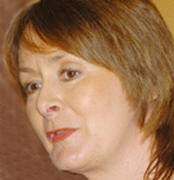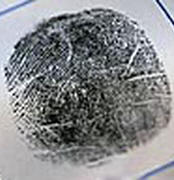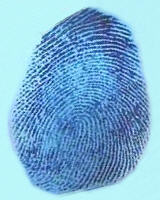| |
 Detective Constable Shirley McKie once had a career with Strathclyde police, but it came crashing to a full stop when she was arrested for perjury. Detective Constable Shirley McKie once had a career with Strathclyde police, but it came crashing to a full stop when she was arrested for perjury.
In January of 1997, police in Kilmarnock are called to the scene of a violent murder. Marion Ross has been stabbed in her bathroom. DC Shirley McKie was one of several detectives assigned to the case. She went into the porch on the first of her 3 visits to the house but she never went into the interior of the house.
The first visit, and the fact that she entered only the porch, was properly logged by a police officer assigned to that task. The further 2 visits, when DC McKie collected the log, copied it and then returned it, were not recorded.
In the course of their inquiries, DC McKie and a detective sergeant visited the home of David Asbury, who had done building work at Marion Ross's home in 1996. They found a biscuit tin containing £1,800 in Mr. Asbury's bedroom and he was subsequently charged with Marion Ross's murder.
 Both officers had touched the tin and they supplied fingerprints for elimination purposes. DC McKie's fingerprints were compared against the 'marks' (the technical term for fingerprints lifted at a crime scene) found in Marion Ross's house. Both officers had touched the tin and they supplied fingerprints for elimination purposes. DC McKie's fingerprints were compared against the 'marks' (the technical term for fingerprints lifted at a crime scene) found in Marion Ross's house.
Even though DC McKie had never entered the house, a fingerprint expert at the Scottish Criminal Records Office at Strathclyde Police HQ in Glasgow concluded that a mark found on the door frame of Marion Ross's bathroom had been made by DC McKie's left thumb.
Three other SCRO experts agreed with the opinion. As fingerprint evidence was vital to the case against David Asbury, DC McKie was placed under intense pressure by her CID colleagues to say that she had been inside Marion Ross's house, but she continued to insist that she had not.
Fingerprint evidence vital
At David Asbury's trial, DC McKie insisted, under oath, that she had not entered the crime scene. In the event, the issue of 'her' stray fingerprint made no difference to the trial's verdict. David Asbury was convicted of Marion Ross's murder in June 1997 and sentenced to life imprisonment.
After the trial was over, DC McKie was visited by a detective chief superintendent and two female detectives, arrested for perjury, taken to Ayr police station, subjected to ritual humiliation by being paraded past fellow officers, charged with perjury, taken to a cell and subjected to a completely unnecessary intimate body search.
Internet expert
Shirley McKie was suspended from her job. Two months before her trial, she did an internet search for 'fingerprint expert' and made contact by email with Pat Wertheim, an internationally known fingerprint expert based in Oregon on the west coast of the USA. He agreed to come to Scotland to compare the crime scene mark with Shirley McKie's fingerprints.
Pat Wertheim's initial reaction was that something had gone horribly wrong at the SCRO because the 'mark' and the reference fingerprint were 'so obviously not the same'. He was shocked to learn that the 'identification' had been verified by a total of 4 experts in the SCRO and, allegedly, by another outside expert.
David Grieve, another American expert, analyzed the print and reached the same conclusion as Pat Wertheim – that the crime scene mark was not made by Shirley McKie.
 The trial & 'damage limitation' The trial & 'damage limitation'
Shirley McKie was put on trial on 14 May 1999. The High Court jury took less than an hour to clear her of perjury and make significant legal history. Police forces had been offering fingerprint evidence for over 100 years and it had never before been rejected.
Strathclyde police then went into damage limitation mode and attemped to discredit the verdict by using smear tactics against both Shirley McKie and Pat Wertheim. The SCRO declared that it was "satisfied with the integrity of the experts from the SCRO, and indeed, their court presentation in this case".
Ron Cook, a former British police detective inspector with 33 years' experience in fingerprinting, was invited to take Shirley McKie's fingerprints and compare them with the crime scene mark. He decided that it was not made by Shirley McKie and 3 other British experts, as well as a former SCRO expert, agreed with his conclusion.
SCRO experts had claimed in court that they had found 16 points of similarity between the crime scene mark and Shirley McKie's left thumbprint. Ron Cook and the other experts found no more than 5 similarities. In addition, they found many differences.
Their evidence cast severe doubt on the competence of the SCRO 'experts' and the value of the testimony of SCRO officers given in previous trials.
A carelessly applied lower standard and escalation
Pat Wertheim said about the first SCRO expert to examine the mark that he: "carelessly applied a lower standard to an officer's fingerprints than he would have applied to a suspect's fingerprints. And I believe the situation escalated."
In other words, the SCRO got it wrong and refused to admit that it could make a mistake. A report by Her Majesty's Chief Inspector of Constabulary also confirmed that the fingerprint evidence against Shirley McKie was wrong.
But worse was to come.
The police case against David Asbury was based on a fingerprint lifted from the tin of money found in his house. The SCRO said that the fingerprint belonged to Marion Ross. Pat Wertheim checked the evidence and found that the fingerprint on the tin did not belong to Marion Ross.
The fingerprint was then posted on a website and other experts confirmed that it did not belong to Marion Ross.
When David Asbury lodged an appealed against his conviction, the Crown Office consulted 2 Danish experts. In their report (2000/08/07), they concluded that the fingerprint on the tin did not match any of Marion Ross's. Pat Wertheim, who had been consulted by David Asbury's defence team, gave a similar opinion.
The cover-up continues . . .
In August 2000, the four SCRO experts who gave evidence against Shirley McKie were suspended, but they were cleared by an internal inquiry.
Scottish National Party MSP Mike Russell commented: "Although the SCRO produced bogus fingerprint evidence against Shirley (McKie), they were not to blame for it, and that there was no question of incompetence or misconduct on their part." He added that the decision "flies in the face of all reason".
His attempts to have the matter debated in the Scottish Parliament were thwarted by 'legal difficulties'. Sir David Steel decided it would fall foul of sub judice rules.
The fight for recompense begins . . .
Shirley McKie sued Strathclyde Police for malicious prosecution but lost her case in February 2002. She ended up with a big legal bill from the force's lawyers but the £13,000 was paid by an anonymous donor in June 2002.
When she sued the Scottish Executive for malicious prosecution in October 2003, a year after David Asbury's conviction for murder had been quashed, her lawyers revealed that 5 experts at the SCRO had disagreed right from the start with their 4 colleagues, who had said that the disputed fingerprint belonged to Shirley McKie.
The concerns of the dissenters were buried by the SCRO.
The Scottish Executive tried to have her court action dismissed on the grounds that SCRO staff are entitled to immunity from prosecution for negligence as they enjoy an absolute immunity in the course of their role as witnesses in a criminal prosecution.
Lord Wheatley concluded that such legal protection does not apply where the cause of the action is one of malicious prosecution.
Shirley McKie obtained a further endorsement from 3 experts of the Scottish Fingerprint Service, who obtained a copy of the fingerprint evidence for her case by accident. They concluded that the thumbprint found at the crime scene was not left by Shirley McKie.
| David Asbury's appeal succeeds
The Court of Criminal Appeal in Edinburgh quashed David Asbury's conviction on 2002/08/14. The Crown did not oppose the appeal, taking the view that if the jury had heard the new evidence, it might have acquitted Mr Asbury. The Crown accepted that there had been a miscarriage of justice. The judges ruled that the fingerprint evidence provided by the Scottish Criminal Records Office (SCRO) was 'unreliable'.
Mr. Asbury was one of a number of builders who had carried out work at the home of Marion Ross in Kilmarnock. The police found a biscuit tin containing £1,400 at his home. He insisted that the money was his savings. An SCRO expert claimed that a fingerprint found on the tin belonged to Marion Ross.
At his trial in 1997, Mr Asbury could offer no explanation as to why a tin with Marion Ross' fingerprint on it should be in his home and he was convicted of her murder. He spent the next three and a half years in gaol.
Detective Constable McKie was acquitted on a perjury charge related to the same case in 1999. She was also the victim of a wrong fingerprint identification by the SCRO. Mr Asbury's lawyers argued that the evidence of SCRO experts had been 'substantially discredited' and Mr Asbury was released from gaol in 2000 pending the appeal hearing, which secured his release in 2002. |
Capitulation without admitting responsibility
In June 2005, the Scottish Executive announced it was willing to settle the Shirley McKie Case on the basis that the fingerprint misidentification was not malicious, but it was not until February 2006 that Shirley McKie obtained compensation of £750,000 after a seven-year struggle.
The Scottish Executive made its out-of-court settlement without admission of liability. "This settlement has been made on the basis that the identification was an honest mistake made in good faith," a spokesman said.
"It has been obvious for years there were criminal goings on in this case and it has been continually covered up," Shirley McKie commented.
A Crown Office spokesman said there was "insufficient reliable evidence" for a prosecution against the SCRO officers and those involved in the 9-year cover-up. and the Scottish Justice Minister, Cathy Jamieson, decided that there would be no public inquiry into the alleged cover-up in the justice system.
Further developments
• In March 2006, Gary Dempster of the Aberdeen fingerprint bureau was told by his employers that he would face a disciplinary hearing for telling the BBC programme Frontline Scotland that it was wrong to suggest an honest mistake had been made in the Shirley McKie case.
• A week later, 3 Scottish Nationalist MSPs and the Liberal-Democrat on the Justice 1 Committee outvoted the Labour MSPs to force a parliamentary inquiry into the Shirley McKie fingerprint case.
"I welcome this investigation as a step forward," said Nicola Sturgeon, the SNP's leader. "However, a parliamentary inquiry is no substitute for a full public inquiry. I believe that it will become clear as this inquiry proceeds that only a full public inquiry can get to the bottom of what went wrong in this case."
 | # |  |
| |




 Detective Constable Shirley McKie once had a career with Strathclyde police, but it came crashing to a full stop when she was arrested for perjury.
Detective Constable Shirley McKie once had a career with Strathclyde police, but it came crashing to a full stop when she was arrested for perjury. Both officers had touched the tin and they supplied fingerprints for elimination purposes. DC McKie's fingerprints were compared against the 'marks' (the technical term for fingerprints lifted at a crime scene) found in Marion Ross's house.
Both officers had touched the tin and they supplied fingerprints for elimination purposes. DC McKie's fingerprints were compared against the 'marks' (the technical term for fingerprints lifted at a crime scene) found in Marion Ross's house.

